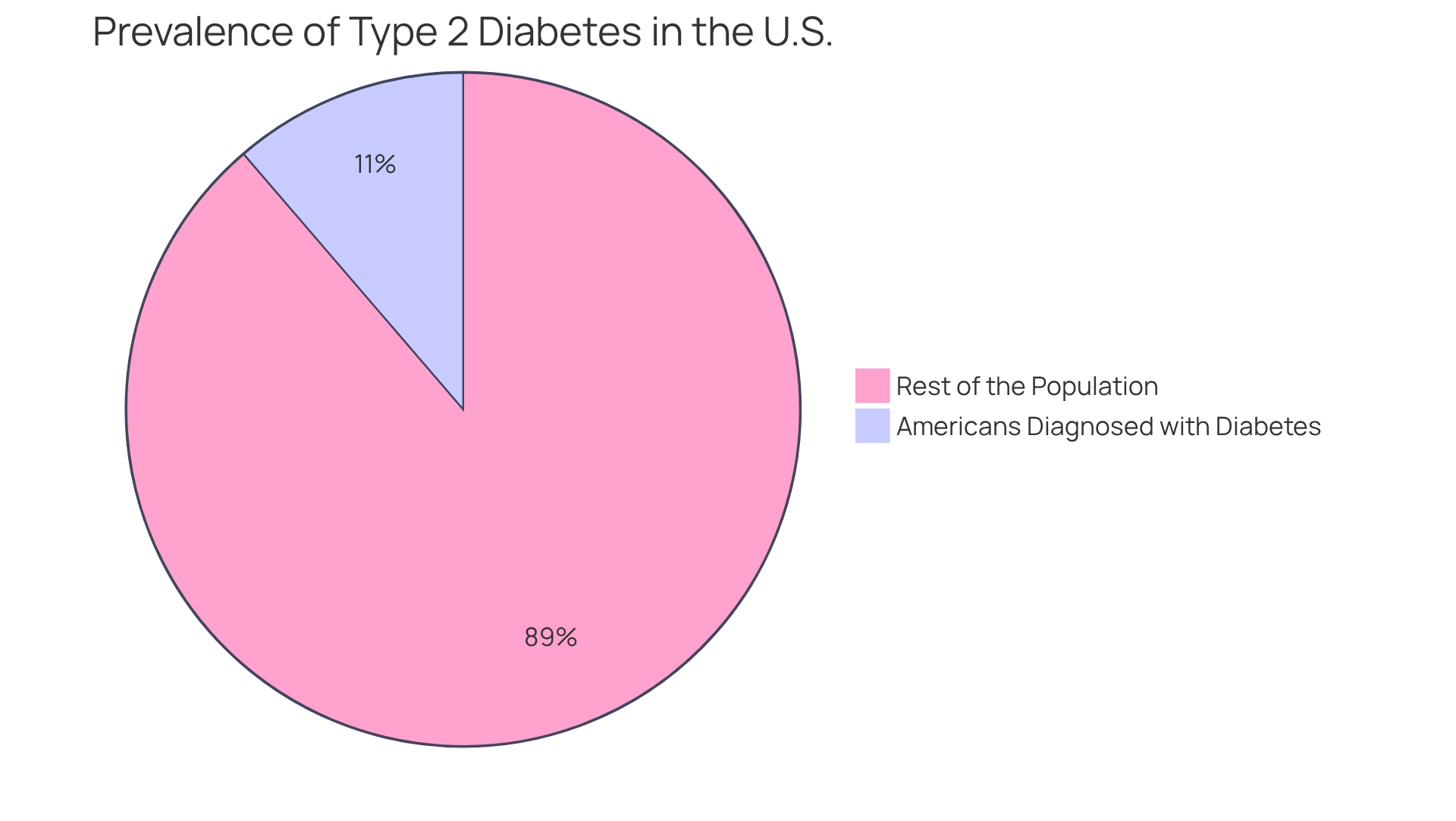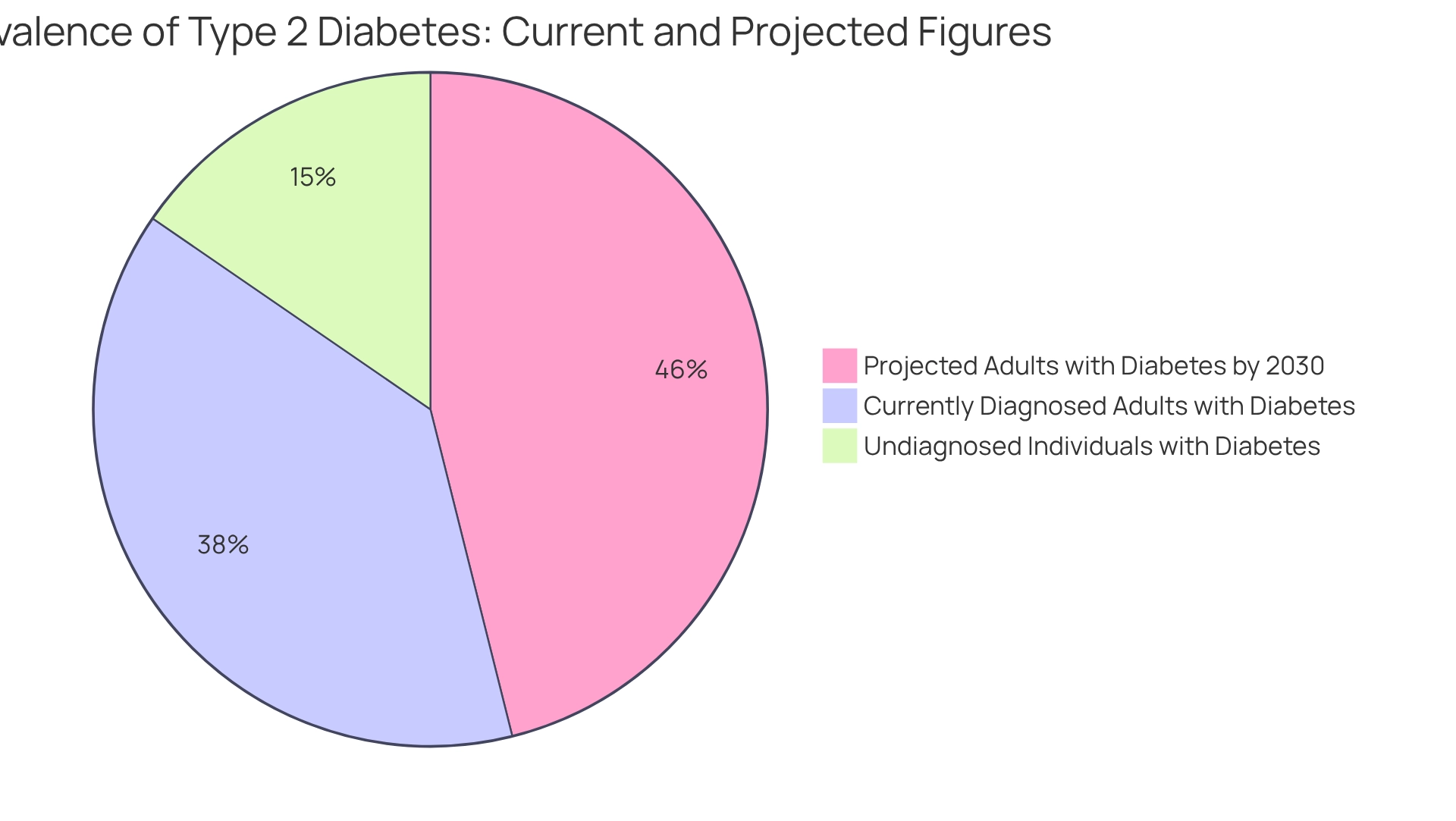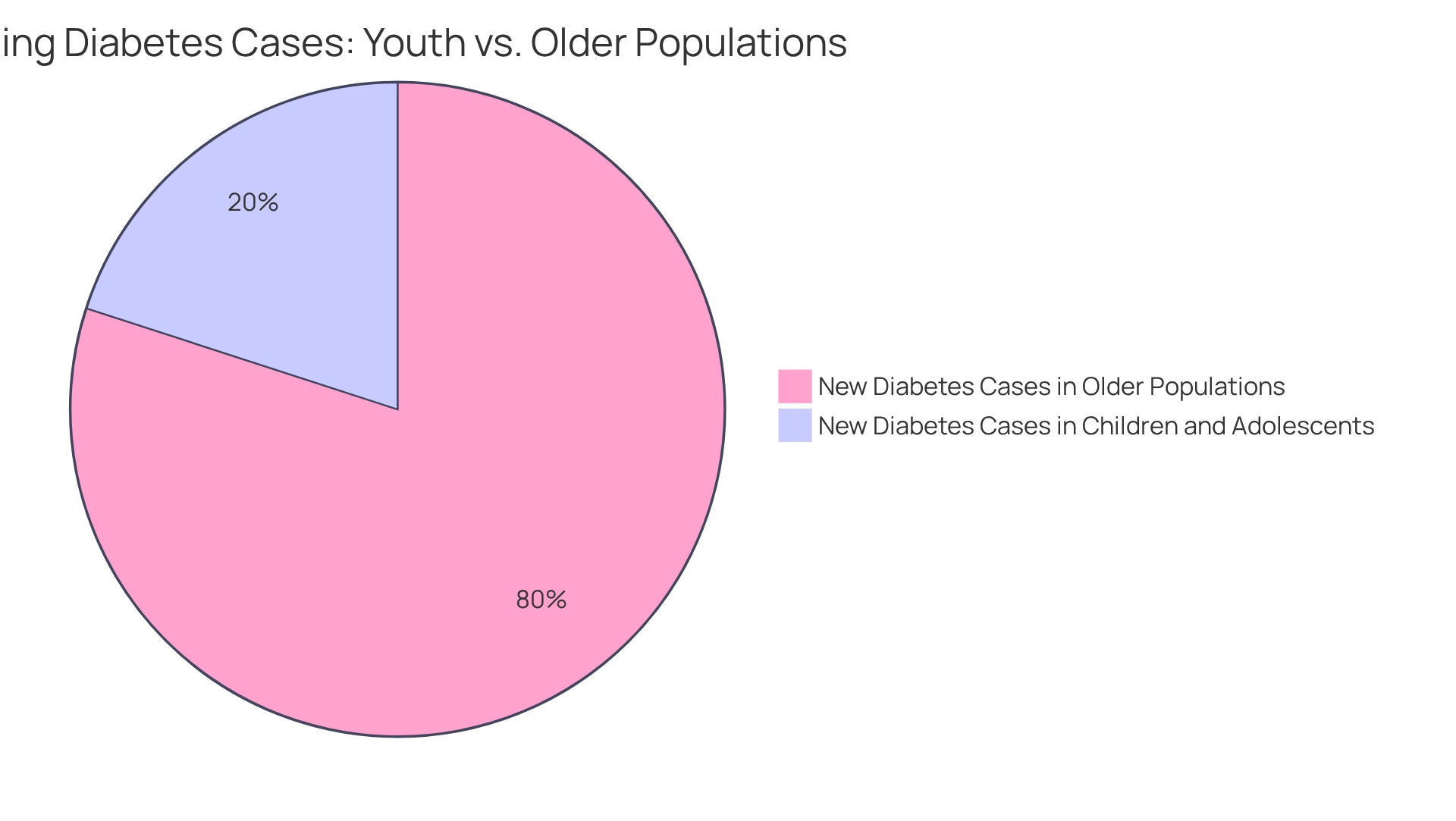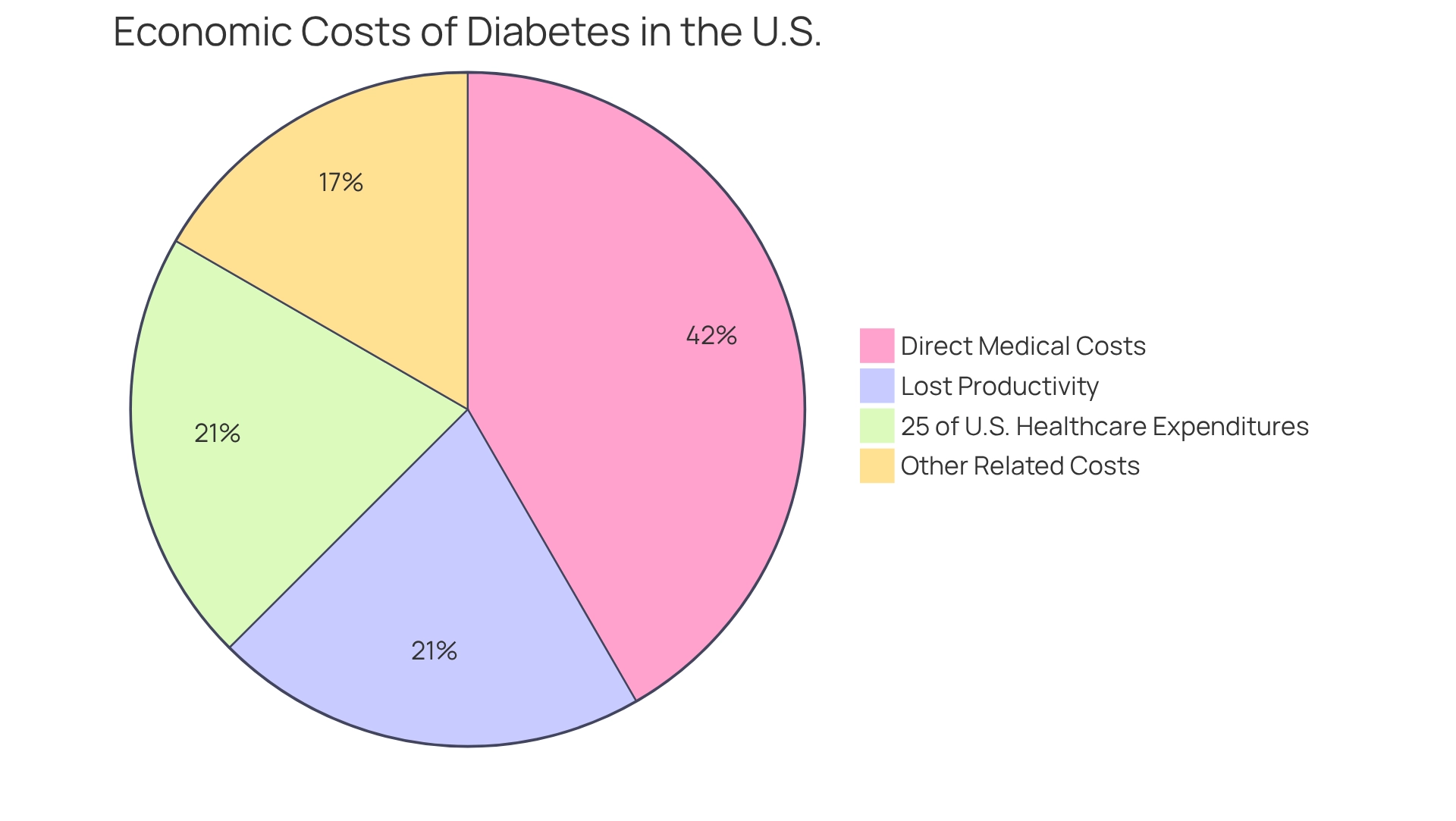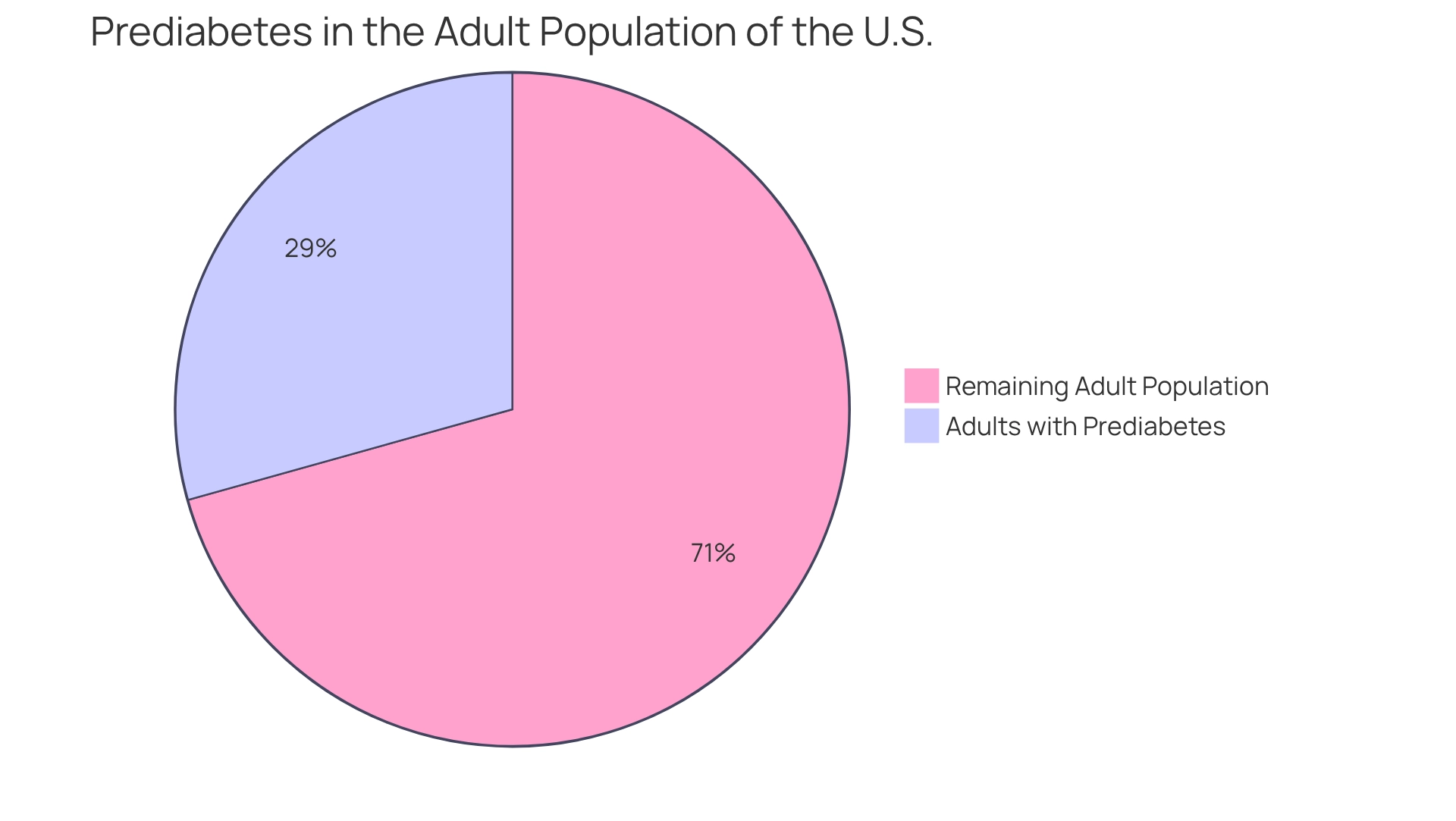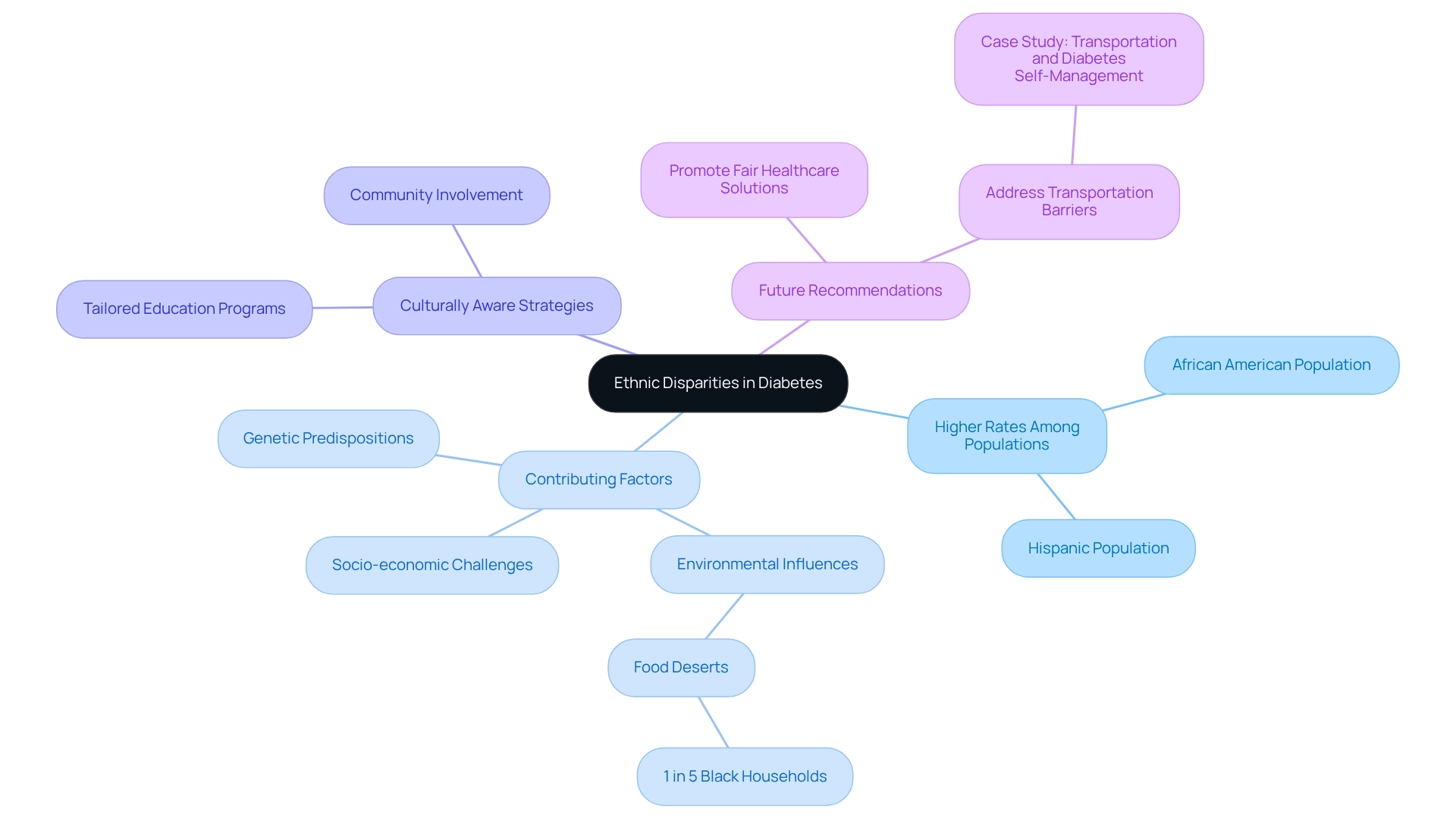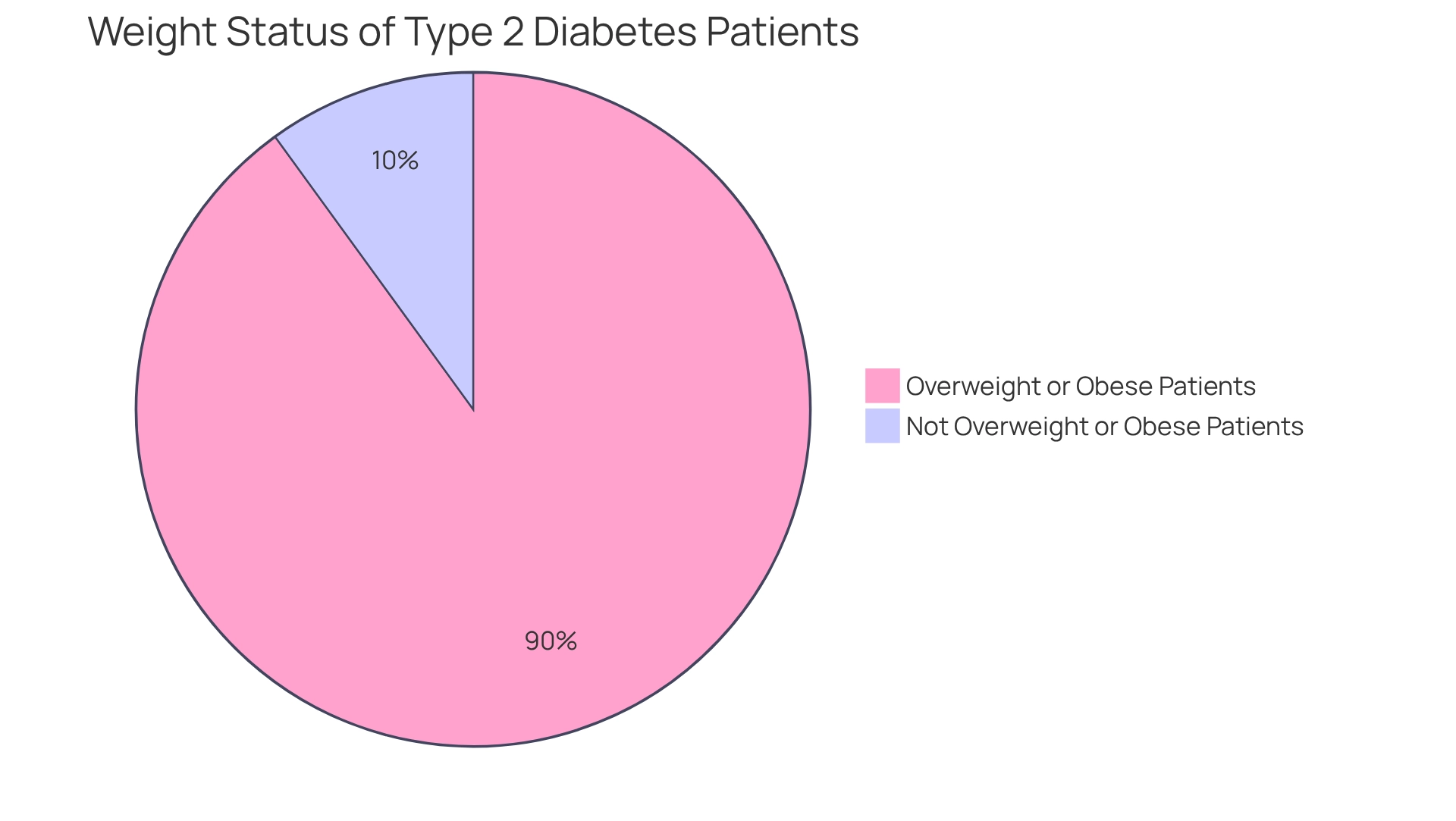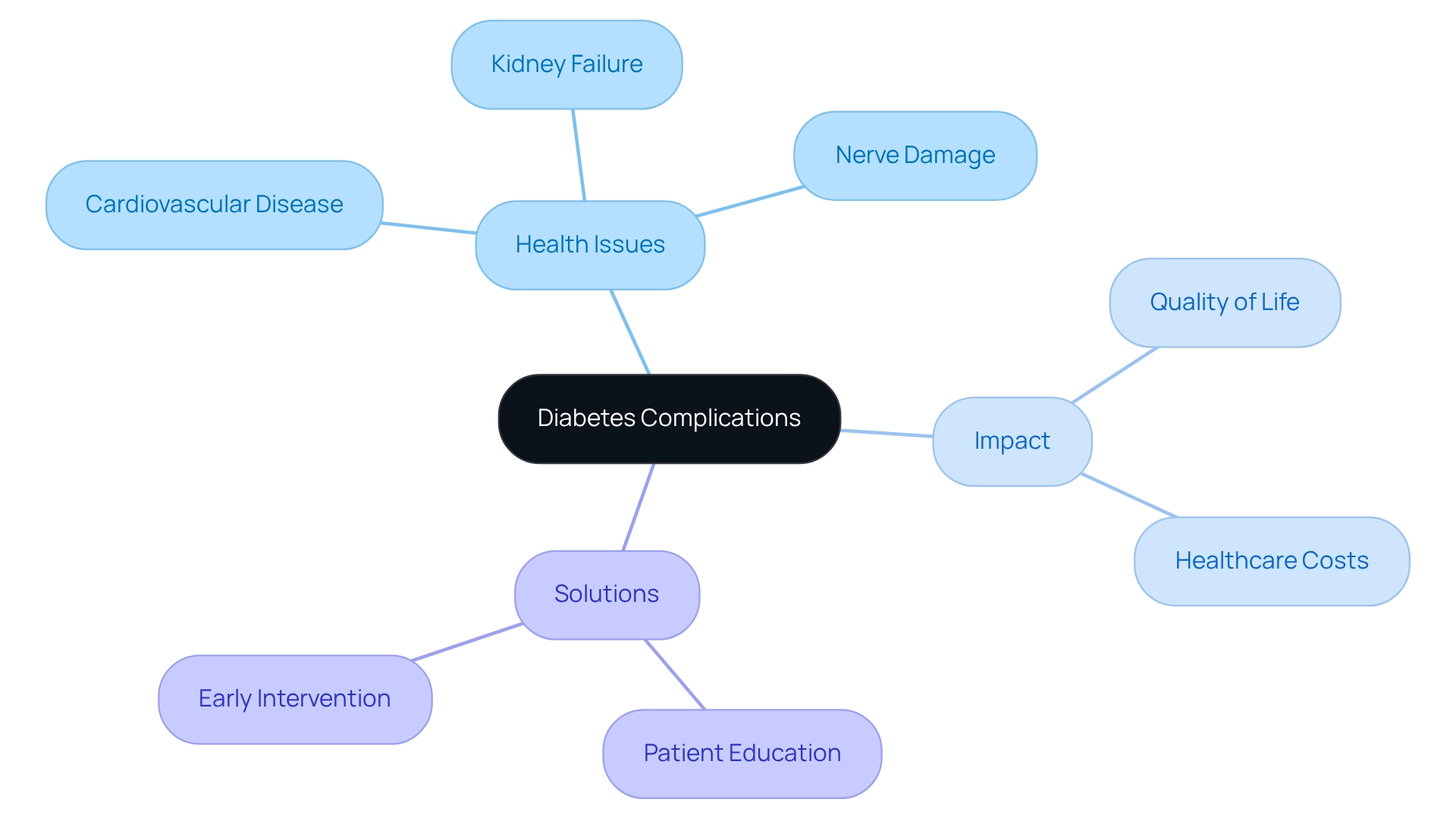Overview
Type 2 diabetes impacts over 37 million Americans, accounting for about 11.3% of the population. This number is projected to increase significantly in the coming years. It’s important to recognize the urgent need for comprehensive education and prevention strategies to tackle this growing public health crisis. Many patients find that nearly 50% of diabetes individuals lack proper management knowledge, which can lead to serious health complications.
This situation can feel overwhelming, but you’re not alone. Understanding the challenges faced by those living with diabetes is crucial. By fostering a supportive environment, we can encourage individuals to seek the knowledge they need to manage their condition effectively. Remember, taking the first step toward better health is always possible.
Consider exploring the 30-Day Diabetes Reset program, designed to empower you with the tools and insights necessary for a healthier lifestyle. Together, we can work towards a brighter future, where diabetes management becomes a shared journey of growth and understanding.
Introduction
In a world grappling with a diabetes epidemic, it’s crucial to address the urgent need for effective management and prevention strategies. Millions are affected globally, and the Integrative Wellness Center’s 30-Day Diabetes Reset Program stands out as a beacon of hope. This program offers a comprehensive approach that transcends conventional treatment. By focusing on personalized coaching, nutritional guidance, and behavioral modifications, it empowers individuals to take charge of their health. This fosters sustainable lifestyle changes that can reverse diabetes and enhance overall well-being.
It’s important to recognize that the statistics reveal a concerning rise in diabetes prevalence, particularly among youth and marginalized communities. The need for holistic solutions is increasingly apparent. Many patients find that innovative strategies and education are vital in reclaiming health and preventing complications. This article delves into the multifaceted challenges posed by diabetes, highlighting these strategies and emphasizing the importance of support in this journey.
Integrative Wellness Center: 30-Day Diabetes Reset Program for Lasting Health Transformation
The Integrative Wellness Center’s 30-Day Diabetes Reset Program is thoughtfully designed to help individuals reclaim their well-being. This program offers personalized coaching, dietary guidance, and behavioral adjustment techniques, fostering lasting lifestyle changes that extend beyond mere health management. It’s important to recognize that by focusing on comprehensive wellness, the program addresses not only blood sugar concerns but also enhances overall well-being, making it an invaluable resource for those looking to reverse their condition and improve their quality of life.
Many participants in the program have reported remarkable results, with an average weight loss of nearly 16 kg, illustrating the program’s effectiveness in encouraging healthier lifestyles. The integration of tailored coaching is crucial, as it adapts strategies to meet personal needs, thereby enhancing health management and promoting lasting change.
Case studies reveal that the program’s holistic approach offers significant benefits, including improved metabolic function and reduced reliance on traditional medical treatments. By concentrating on the underlying factors of type 2 diabetes, the 30-Day Reset Program empowers participants to take control of their wellness journey, which helps them to understand how many people have type 2 diabetes, leading to transformative results and a renewed sense of well-being.
Dr. Jason Shumard, with nearly 20 years of experience in functional medicine, emphasizes, “The center provides an extensive 30-Day Reset program aimed at equipping patients with the essential resources and understanding to enhance their well-being and manage their condition effectively.”
Join us today and take the first step toward a healthier future!
CDC Report: Over 37 million Americans Diagnosed with Diabetes
According to the CDC, there are over 37 million Americans diagnosed with this condition, highlighting how many people have type 2 diabetes, which represents about 11.3% of the population. This alarming statistic reflects a growing public health crisis that urgently calls for our attention and action. In 2021 alone, 1.2 million adults aged 18 and older received a new diagnosis of a metabolic disorder, underscoring the pressing need for effective prevention and control strategies. It’s important to recognize that understanding the widespread nature of this illness can inspire individuals to pursue preventive actions and efficient management techniques to tackle this chronic condition.
The ramifications of these statistics extend beyond individual well-being, impacting public wellness programs aimed at reducing the avoidable effects of type 2 blood sugar issues. Many patients find that addressing this epidemic requires a multifaceted approach, including education and community support. Dr. Jason Shumard states, “By offering patients actionable insights and practical tools, the center cultivates an atmosphere where individuals can regain their wellness and well-being.” Through educational materials, like workshops and literature, patients gain valuable information that deepens their understanding of their condition, ultimately leading to better health outcomes.
Dr. Shumard’s comprehensive approach emphasizes nutrition, exercise, and stress management, enabling patients to adopt lifestyle changes that effectively control their condition. The urgency of addressing how many people have type 2 diabetes is further highlighted by public wellness specialists, who stress the importance of early intervention and comprehensive care. By nurturing an environment of learning and empowerment, healthcare providers can significantly influence the trajectory of this condition in the U.S., helping individuals reclaim their health and well-being. Reach out to us today to discover more about how Dr. Shumard can assist you in managing your condition effectively.
International Diabetes Federation: 537 Million Adults Living with Diabetes Worldwide
Did you know how many people have type 2 diabetes, with approximately 537 million adults currently living with it worldwide? This staggering figure from the International Diabetes Federation reveals a health crisis that affects us all, including insights into how many people have type 2 diabetes, cutting across demographics and geographical lines. It’s important to recognize that the rising prevalence of this condition calls for urgent action in education, prevention, and management strategies to mitigate its impact on public health. Many patients find that the prospect of how many people have type 2 diabetes increasing to 643 million by 2030 is daunting. This reality underscores the need for comprehensive approaches to address diabetes—now more than ever. Health leaders emphasize that it’s not just about raising awareness; we must also take proactive steps to ensure early diagnosis and effective management. Alarmingly, over 40% of individuals with diabetes remain undiagnosed, which highlights the importance of prioritizing these efforts.
Together, we can tackle this growing health crisis and improve health outcomes for millions. Let’s focus on creating a supportive community that encourages healthy living and empowers individuals to take control of their health. Remember, you are not alone in this journey, and there are resources available to help you every step of the way.
Youth Diabetes Statistics: 1 in 5 New Cases of Diabetes in Children and Adolescents
Recent statistics reveal a concerning shift: 1 in 5 new cases of this condition is now diagnosed in children and adolescents. This change challenges the traditional view that primarily associates the illness with older adults. It’s important to recognize that this trend underscores the critical need for early intervention and education to help prevent the progression of the condition in younger populations. Experts emphasize the importance of comprehensive wellness programs that address lifestyle factors—like diet, physical activity, and mental well-being—as essential tools in combating this rising epidemic. Many families find that employing monitoring techniques, such as fitness applications, logs, and pedometers, can be incredibly helpful in overseeing their well-being and establishing SMART objectives for improved management.
Looking ahead to 2025, the incidence of blood sugar issues among young people is expected to continue rising, which could significantly impact long-term wellness outcomes. Pediatric specialists advocate for proactive measures, including community-based initiatives and school programs, to promote healthy habits from an early age. Effective interventions have shown that culturally customized strategies can successfully lower the risk of metabolic disorders in various populations. For instance, a case study from the Integrative Wellness Center illustrates how families engaged in community wellness programs reported better well-being outcomes and a lower risk of diabetes-related issues.
As the number of cases among children increases, it becomes crucial to prioritize education and resources that empower families to make informed wellness decisions. By nurturing an environment that encourages healthy living—like consistent physical activity and balanced nutrition—we can help mitigate the impact of this condition on future generations. Applying efficient monitoring techniques and establishing SMART objectives can further enhance health management, ensuring that families are well-prepared to face the challenges posed by this condition.
Economic Impact: Diabetes Costs Exceed $327 Billion Annually in the U.S.
The economic effect of this condition in the United States is staggering, with costs exceeding $327 billion each year. This figure encompasses direct medical expenditures, lost productivity, and other related costs, demonstrating the significant financial strain that this condition places not only on individuals but also on the healthcare system overall. It’s important to recognize that approximately 25% of U.S. healthcare expenditures are incurred by individuals living with this condition. The American Diabetes Association (ADA) is dedicated to enhancing the quality of life for over 133 million Americans impacted by the condition or prediabetes, emphasizing the need for effective management strategies.
Many patients find that investing in preventive measures can significantly mitigate these costs. For instance, effective cost-reduction strategies in managing blood sugar conditions highlight the importance of early intervention and education, empowering patients to handle their situations proactively. However, the intricacy of estimating costs related to the condition arises from differences in data sources and methodologies, requiring continuous updates to represent the changing nature of prevalence.
By tackling these challenges and applying thorough management strategies, both individuals and society can strive to ease the financial burden of the condition. Together, we can work towards a healthier future, where effective support and understanding pave the way for improved lives.
Prediabetes Prevalence: 88 Million Adults in the U.S. at Risk
It’s important to recognize that approximately 88 million adults in the United States are currently living with prediabetes. This condition significantly increases the risk of developing type 2 diabetes, leading to questions about how many people have type 2 diabetes, which can feel overwhelming. However, there is hope. Research shows that simple lifestyle changes—like enhanced dietary choices and increased physical activity—can effectively reverse prediabetes and help address the question of how many people have type 2 diabetes. Many patients find that by making these adjustments, they can take control of their health.
Education and awareness are crucial components of our public well-being strategies aimed at tackling this escalating epidemic. By promoting a deeper understanding of prediabetes, individuals can take practical steps toward improving their well-being and lowering their risk of chronic illness. Imagine feeling empowered to make choices that not only enhance your health but also enrich your life. Together, we can navigate this journey toward better health and a brighter future.
Ethnic Disparities: Higher Diabetes Rates Among African American and Hispanic Populations
Diabetes prevalence is significantly higher among African American and Hispanic populations compared to their white counterparts. Recent statistics reveal that these groups face a disproportionate burden of the disease. It’s important to recognize that various factors contribute to these disparities, including:
- Genetic predispositions
- Environmental influences
- Socio-economic challenges
For instance, did you know that 1 out of every 5 Black households resides in a food desert? This restricts access to healthy food choices, which are vital for managing blood sugar levels.
Many patients find that culturally aware strategies for education and management are essential in tackling these inequalities. Community wellness leaders emphasize the need for tailored programs that resonate with the unique cultural contexts of these populations. Effective programs have shown that when diabetes education incorporates cultural values and practices, patient involvement and wellness results enhance considerably. A case study focusing on low-income Latino groups highlights the importance of transportation in self-management. Access to care is frequently obstructed by logistical challenges, underscoring the significance of addressing social factors that influence well-being to improve management resources for those with diabetes.
As we approach 2025, let’s persist in promoting fair healthcare solutions that empower underrepresented communities. By cultivating a setting of understanding and support, we can help close the divide in glucose management and enhance the overall well-being of these groups. For individualized guidance and support tailored to specific needs, consider reaching out to Dr. Jason Shumard at Integrative Wellness Center. Here, a transformative approach to health management is provided, emphasizing nutrition, exercise, and community involvement.
Obesity Link: 90% of Type 2 Diabetes Patients are Overweight or Obese
It’s important to recognize that nearly 90% of individuals diagnosed with type 2 conditions are either overweight or obese. This statistic underscores the vital role of weight management in both preventing and controlling this chronic illness. Many patients find that making effective lifestyle changes—like dietary adjustments and increasing physical activity—can significantly lower their risk of serious health issues and improve outcomes for those already affected.
Nutritionists often promote a balanced diet rich in whole foods, while fitness specialists emphasize the importance of regular exercise as a cornerstone of health. Successful case studies reveal that patients participating in organized weight control programs experience notable improvements in their well-being. This illustrates that taking proactive steps can lead to meaningful transformations.
As obesity rates continue to rise, particularly among those with type 2 conditions, the need for comprehensive weight management strategies becomes increasingly clear. By prioritizing education and empowerment, individuals can take charge of their health and significantly reduce their risk of developing blood sugar issues. Remember, every small step counts in this journey toward better health.
Complications: 1 in 3 Adults with Diabetes Experience Serious Health Issues
It’s important to recognize that roughly one in three adults suffering from this condition faces significant medical complications, such as:
- cardiovascular disease
- kidney failure
- nerve damage
These challenges not only diminish quality of life but also lead to increased healthcare costs. Many patients find that the lack of adequate treatment is alarming; in 2025, nearly 43 million adults aged 30 and older are estimated to be affected, raising questions about how many people have type 2 diabetes, which highlights a critical gap in care. Healthcare experts emphasize that early intervention and ongoing supervision can prevent the emergence of serious complications. This underscores the significance of patient education and empowerment in care. By taking small, manageable steps, individuals can regain control over their health.
The World Health Organization’s Global Diabetes Compact aims to address these pressing issues, particularly in low- and middle-income nations, by establishing ambitious goals for better blood sugar control by 2030. By implementing effective strategies and fostering a supportive environment, individuals can reclaim their well-being and significantly lessen the impact of diabetes-related challenges. Remember, you’re not alone on this journey; together, we can work towards a healthier future.
Empowerment Through Education: 50% of Diabetes Patients Lack Proper Management Knowledge
It’s important to recognize that nearly 50% of individuals living with diabetes lack essential information for managing their health effectively. This significant knowledge gap can unfortunately lead to negative medical outcomes and increased complications. Empowering patients through comprehensive education is crucial for enhancing diabetes care. Programs designed to provide actionable insights and practical tools enable individuals to take charge of their health, fostering informed decision-making regarding their care.
Many patients find that successful empowerment strategies, such as those offered at Dr. Jason Shumard’s Functional Medicine Center, demonstrate how educational initiatives can significantly improve management outcomes. Testimonials from participants reveal a heartfelt appreciation for the knowledge gained, which not only enhances their understanding of the condition but also equips them to navigate their treatment options more effectively.
Have you ever felt overwhelmed by your diagnosis? Many have shared transformative wellness journeys, highlighting how personalized plans and thorough testing have empowered them to overcome challenges related to blood sugar. Bridging this knowledge gap is essential for fostering a proactive approach to health, ultimately leading to a better quality of life and reduced reliance on conventional medical interventions.
To learn more about how our services can help you manage your diabetes effectively, we invite you to contact us today or register for our upcoming seminars. Together, we can embark on a journey toward better health.
Conclusion
The rising diabetes epidemic is a significant challenge to global health, affecting millions across diverse populations. It’s important to recognize that the Integrative Wellness Center’s 30-Day Diabetes Reset Program offers a proactive and comprehensive solution. This program focuses on personalized coaching, nutritional guidance, and behavioral modifications. By taking a holistic approach, we not only target diabetes management but also empower individuals to reclaim their health and improve their overall well-being.
Many patients find that statistics reveal a troubling trend, particularly among youth and marginalized communities, where the prevalence of diabetes continues to rise. The need for innovative, culturally sensitive strategies is essential to address these disparities and promote health equity. By fostering education and community support, healthcare initiatives can significantly impact diabetes prevention and management, ultimately leading to improved health outcomes.
As the economic burden of diabetes exceeds $327 billion annually in the U.S., it’s vital to invest in preventive measures and effective management strategies. Empowering individuals with knowledge and tools can mitigate costs and enhance quality of life, highlighting the importance of early intervention and lifestyle changes. By prioritizing education, community engagement, and personalized care, we can combat the diabetes epidemic and foster a healthier future for all.
Frequently Asked Questions
What is the 30-Day Diabetes Reset Program at the Integrative Wellness Center?
The 30-Day Diabetes Reset Program is designed to help individuals improve their well-being through personalized coaching, dietary guidance, and behavioral adjustment techniques aimed at fostering lasting lifestyle changes.
What results have participants experienced from the program?
Participants have reported significant results, including an average weight loss of nearly 16 kg, indicating the program’s effectiveness in promoting healthier lifestyles.
How does the program address type 2 diabetes?
The program takes a holistic approach by focusing on the underlying factors of type 2 diabetes, which empowers participants to manage their condition effectively and improve their overall well-being.
Who is Dr. Jason Shumard and what is his role in the program?
Dr. Jason Shumard has nearly 20 years of experience in functional medicine and emphasizes that the center’s program equips patients with essential resources and understanding to enhance their wellness and manage their condition.
What is the current state of diabetes in the U.S. according to the CDC?
The CDC reports that over 37 million Americans are diagnosed with diabetes, representing about 11.3% of the population, highlighting a significant public health crisis.
What does the CDC emphasize regarding diabetes management?
The CDC emphasizes the need for effective prevention and control strategies, as well as the importance of education and community support in addressing the diabetes epidemic.
How many adults worldwide are living with diabetes?
Approximately 537 million adults are currently living with diabetes worldwide, according to the International Diabetes Federation.
What is the projected increase in diabetes prevalence by 2030?
The number of individuals with diabetes is expected to increase to 643 million by 2030, underscoring the urgent need for proactive education, prevention, and management strategies.
What percentage of individuals with diabetes remain undiagnosed?
Alarmingly, over 40% of individuals with diabetes remain undiagnosed, highlighting the importance of early diagnosis and management efforts.
How can individuals find support in managing their diabetes?
Individuals are encouraged to create a supportive community that promotes healthy living and empowers them to take control of their health, with various resources available to assist them.
